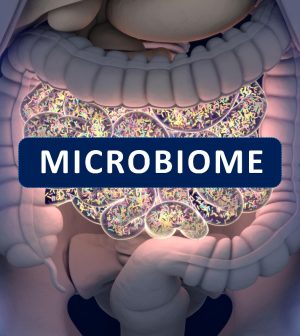- Could Your Grocery Store Meat Be Causing Recurring UTIs?
- Are You Making This Expensive Thermostat Error This Winter?
- Recognizing the Signs of Hypothyroidism
- 10 Strategies to Overcome Insomnia
- Could Artificial Sweeteners Be Aging the Brain Faster?
- Techniques for Soothing Your Nervous System
- Does the Water in Your House Smell Funny? Here’s Why
- Can a Daily Dose of Apple Cider Vinegar Actually Aid Weight Loss?
- 6 Health Beverages That Can Actually Spike Your Blood Sugar
- Treatment Options for Social Anxiety Disorder
Scientists Spot Which Gut Germs Trigger Compulsive Eating

Specific types of gut bacteria appear to be linked to compulsive eating, a new study reports.
Researchers found that one type of gut bacteria — the Proteobacteria family — is abundant in people and mice with an addiction to food.
Other types of gut bacteria are decreased in food-addicted people and mice, including Blautia bacteria and bacteria belonging to the Actinobacteria family, researchers say.
What’s more, food addiction decreased in mice when they were fed prebiotics that caused Blautia levels in the gut to rise, said researcher Elena Martin-Garcia, a professor of medicine and life sciences at the Universitat Pompeu Fabra in Barcelona.
These results suggest the “potential protective effects of increasing the abundance of Actinobacterial and Bacillota against the development of food addiction,” Martin-Garcia said. Blautia belongs to the Bacillota family.
For the study, researchers used a food addiction scale to diagnose the condition in mice and humans. The scale measures persistent food-seeking, motivation to obtain food and compulsive behavior.
They found that mice with food addiction had higher levels of Proteobacteria and lower levels of Actinobacteria and Blautia.
Those same trends were seen in 88 humans, researchers said.
“The findings in both mice and humans suggested that specific microbiota could be protective in preventing food addiction,” Martin-Garcia said. “In particular, the strong similarities in the amount of Blautia underlined the potential beneficial effects of this particular gut bacteria.”
Tests on mice found that their food addiction did indeed decrease when Blautia levels in their gut rose, results show.
The results show how bacteria in the gut can influence brain function, and vice versa, Martin-Garcia said.
Martin-Garcia presented the findings at the annual meeting of the Federation of European Neurosciences Societies in Vienna. The results were also published June 26 in the journal Gut.
“Understanding the crosstalk between alterations in behavior and bacteria in the gut constitutes a step forward for future treatments for food addiction and related eating disorders,” Martin-Garcia said in a meeting news release.
More information
The Cleveland Clinic has more on the gut microbiome.
SOURCE: Federation of European Neurosciences Societies, news release, June 26, 2024
Source: HealthDay
Copyright © 2026 HealthDay. All rights reserved.










